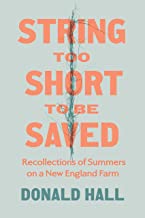String Too Short to be Saved by Donald Hall 1961
Hall’s collection of reminiscences about his summers with his grandparents at their home in Wilmot, NH has been a favorite of mine for decades. Published in 1961 when he was 32 but likely written sometime earlier, they tell the story of a disappearing world, the small, self-sufficient New England hillside farm where families and communities helped each other and where the world seldom stretched beyond the distance a horse could travel in half a day.
Hall grew up in Hamden, CT where his father ran a dairy and his mother was a mid-20th C housewife. He went to Harvard and then Oxford and was already writing published poetry and prose during those years. His tenured professorship at University of Michigan ended when after a divorce and a depressed 6 year period, he married a graduate student and soon to be successful poet, Jane Kenyon, and moved to the same NH farmhouse where he had spent his summers. Named U.S. Poet Laureate in 2006 and nominated for nearly every literary prize, he published more than 50 books from poetry to children’s books (‘Ox Cart Man’ and ‘The Man Who Lived Alone’ were my daughters’ favorites and remain popular with my grandchildren now), from essays to short stories. He was also my pen pal for over 50 years before dying in 2018.
I met Hall when I invited him to be the speaker at our U of M Medical School Honorary Society’s annual dinner. He had been my wife’s professor in an English course, and I thought a poet might liven up the annual boring dinner. I was right. We sat with him, became friends, and began a long correspondence. I would send off a letter and within days receive back a typewritten note (with corrections made in black ink) in an envelope with the return address of Eagle Pond. Books, writers, and his beloved Red Sox were the stuff of the letters. He was a funny, literate, and thoroughly authentic person. I miss his letters.
This book details the people and daily routine through the year that made up the life on a New England farm in the 1940’s. Wesley Wells and Kate were his mother’s parents and are the featured players in this fine collection of essays. The book is enhanced by an Epilogue written by Hall in 1979 when the book was re-issued and an Afterward written in 2015 for the publication of this edition by David Godine publishers in 2021. Read this book if you love New England, the outdoors, and the memories of what it’s like to be a young child with dear grandparents. Reading it for the third or fourth time was still a joy for me.



